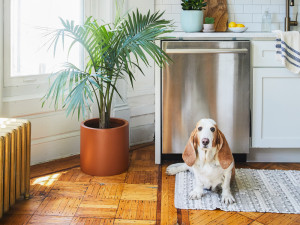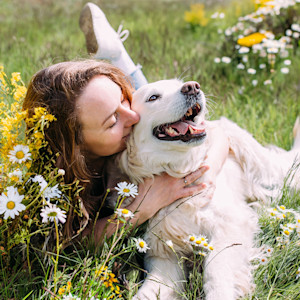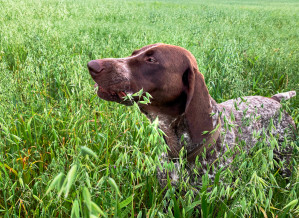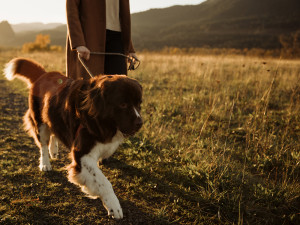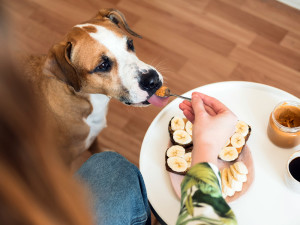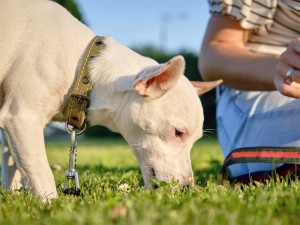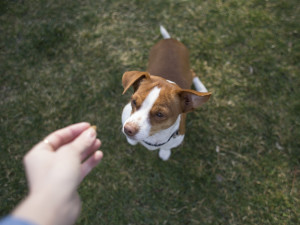Are Sunflowers Toxic to Dogs?
They are the best part of late summer. Can your pup take a sniff?
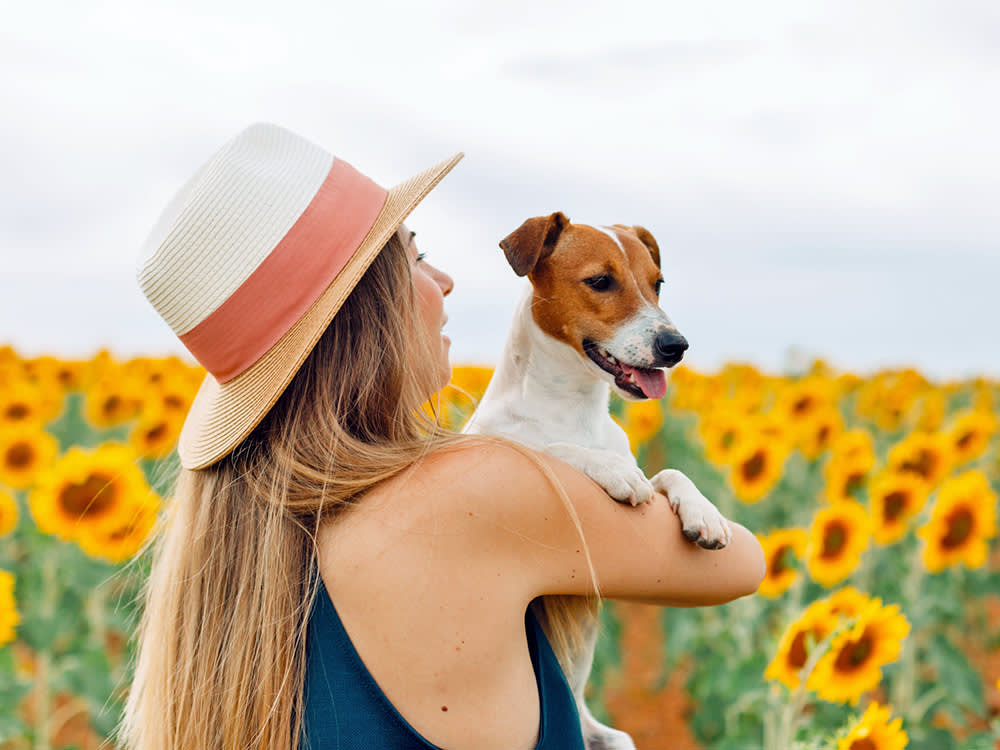
Share Article
The right flowers can brighten up your home or garden space and bring a little extra color and cheer into your daily life. But you don’t want to plant anything that could present a potential hazard to your dog, especially if you have a pup who loves to chew on everything.
So where do sunflowers fall on the poison scale for dogs? Fortunately, sunflowers are not toxic to canines, and it’s relatively safe for your dog to eat any part of the plant. But there are still things you should be aware of before letting your dog run rampant in the garden.

littleKin™ is Kinship’s home just for puppy and kitten parents. Bop over to check out expert advice, new pet tools, and special deals—all curated for your newest family member.
opens in a new tabWhy are sunflowers safe for dogs?
Sunflowers don’t present any health risks to dogs because they are not toxic. However, this doesn’t mean your dog should eat as many of the plants as they want. Eating too much of anything, especially vegetation, can result in an upset stomach for your pup, according to Dr. Holly Anne Hillsopens in a new tab. And while sunflower seeds may have some health benefitsopens in a new tab, they present the risk of causing an intestinal blockage in your dog’s stomach.
What should I do if my dog has eaten sunflowers?
If your dog has chomped on a sunflower or two, don’t stress. They will likely pass the plant without any problems. Just make sure your dog doesn’t turn your garden into a buffet to avoid stomach upset.
You should also be wary of letting your dog consume sunflower seeds. Dogs aren’t able to break the shells the way we can, and eating sunflower seeds could cause an intestinal blockage, especially in smaller dogs.
While sunflowers may be non-poisonous, if you suspect your dog has eaten something toxic, call your vet immediately or contact ASPCA Animal Poison Controlopens in a new tab at 888-426-4435.
Diagnosing plant poisoning in dogs
If your dog has eaten a toxic plant, get them to the vet or an emergency vet clinic immediately. Bring a sample of the plant your dog consumed if possible and tell the vet how much your dog ate. The veterinarian will perform a variety of tests to determine if your dog is in any danger and will present options for next steps.
Symptoms of plant poisoning in dogs
If you notice any of these symptoms in your dog, contact the vet right away:
Vomiting or diarrhea
Loss of appetite
Difficulty breathing
Tremors or uncoordinated movements
Lethargy
Excessive drooling
Any changes in behavior
Treatment
The vet will decide on the appropriate treatment for your dog. This may include hydrogen peroxide or a similar mixture to induce vomiting or a liquid suspension of activated charcoal, which can help absorb some toxins. In more serious cases, your dog may need intravenous fluids and medications.
How to prevent plant poisoning
The best way to keep your dog from consuming a toxic plant is to keep these plants out of your home or garden. Instead, choose non-poisonous options. If you do decide to keep toxic plants, make sure that they are safely out of your dog’s reach.
Are all parts of sunflowers safe for dogs?
Sunflowers are completely non-toxic for dogs, but you should still avoid letting them eat too much vegetation because they may have trouble digesting it. In addition, sunflower seeds can cause an intestinal blockage if your dog consumes them.
How do I stop my dogs from eating sunflowers?
To keep your dog away from your sunflowers (and any other plants), fence off your gardenopens in a new tab to ensure they can’t enter the space. You may also want to invest in behavioral training to help your dog stay out of prohibited areas.
The bottom line: Are sunflowers poisonous for my dog?
No, sunflowers are non-toxic to dogs, and in most cases, they can consume and pass the plants without harm. Just be aware of the potential for a blocked intestine from sunflower seeds or an upset stomach from eating too much raw plant material.
Other plants that are safe for dogs
There are plenty of plants you can keep in your home or gardenopens in a new tab that don’t present the risk of harm to your pets. Choose from these or other dog-safe plantsopens in a new tab to brighten up your home:
Spider plant
Prayer plant
Cat grass
Staghorn fern
Boston fern
Other plants that are dangerous for dogs
Be aware of what plants are toxic to dogsopens in a new tab and keep these out of your home and garden:
Pothos
Aloe vera
Cyclamen
Sago palm
FAQs (People also ask)
What happens if a dog eats sunflowers?
Most likely, consuming sunflowers will present no problems for your dog. In some cases, sunflower seeds may cause intestinal blockage, or they may suffer an upset stomach from eating too much of the plant.
Can sunflowers be toxic to dogs?
No, sunflowers are not toxic to dogs.
Are sunflowers poisonous to dogs if they smell them?
Your dog can safely smell sunflowers without worrying about any ill effects.
References:

Savannah Admire
Savannah Admire is a writer, poet, and pet mom to three dogs and a cat. She currently lives in Western Maryland. When she’s not writing, you can find her reading, taking photos, or volunteering as a content creator for her local community theatre. Her debut poetry book, Mother Viper, is due out August 12, 2025, and you can follow her on Instagram at @savannahcooperpoetopens in a new tab.
Related articles
- opens in a new tab
Is Lawn Fertilizer Toxic to Dogs?
It keeps your grass lush and green, but your pup shouldn’t ingest it. Here’s why.
![Kurzhaar's dog eats grass, oats, happy puppy playing in the meadow]() opens in a new tab
opens in a new tabWhy Do Dogs Eat Grass?
Your pup is literally vegging out—when it’s no big deal and when to worry.
- opens in a new tab
Can Dogs Eat Peaches?
It’s the best fruit of the season, after all.
- opens in a new tab
Can Dogs Get Poison Ivy?
It’s worth asking, especially ahead of all those hikes you’ll take together this summer.
![Happy couple cooking dinner with dog watching.]() opens in a new tab
opens in a new tabCan Dogs Eat Garlic?
Like vampires, they should stay far away. Here’s why.
![Dog on leash running in a field without foxtails]() opens in a new tab
opens in a new tabWhy Foxtails Are So Dangerous for Your Dog
Late spring is prime time for these blades of grass that pose a serious risk to your pup.
![Having breakfast and peanut butter with dog at home.]() opens in a new tab
opens in a new tabCan Dogs Eat Peanuts?
Peanuts are a great occasional protein-packed snack, but pay attention to this guidance.
- opens in a new tab
Why Does My Dog Eat Dirt?
That’s not food, bud.
- opens in a new tab
Can Dogs Eat Almonds (and Other Nuts)?
This healthy snack for humans isn't so healthy for your pup. Here's why it's best to avoid them.

